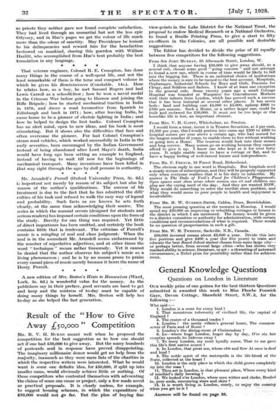Result of the " How to Give Away £50,000 "
Competition
Mn. R. V. H. BURNE meant well when he proposed the competition for the best suggestion as to how one should act if one had £50,000 to give away. But the many hundreds of postcards sent in response have proved disappointing. The imaginary millionaire donor would get no help from the Majority, inasmuch as they were mere lists of the charities in Which the respective writers were interested. What he would want is some one definite idea, for £50,000, if split up into 'smaller sums, would obviously achieve little or nothing. Of those competitors who contented themselves with advocating the claims of some one cause or project, only a few made novel or practical proposals. It is clearly useless, for example, to suggest housing schemes, in which the expenditure of £50,000 would not go far. Eat the plan of buying fine view-points in the Lake District for the National Trust, the proposal to endow Medical Research or a National Orchestra, to found a Braille Printing Press, to give a start to fifty ex-officers in the Colonies, are all possible and desirable suggestions.'
The Editor has decided to "divide the prize of £5 equally between five competitors for the following suggestions.
From SIR Joint MURRAY, 50 Albemarle Street, London, W.
I think that anyone having £50,000 to give away should, as a general rule, choose some good " going concern " and not attempt .to found a_new one, which in course of time would be likely to fall into the begging list. There is an unlimited choice of institutions where the money is sure to be turned to the best account. 'Hospitals, Orphanages, Industrial Schools for Boys and Girls, Pensions for Clergy, and Soldiers and Sailors. I know of at least one exception to the general rule. Some twenty years ago a small Cottage Hospital was founded at Wargrave for Convalescent Mothers with their infants from London, which has proved such a success that it has been imitated at several other places. It has seven . beds : land and building Cost £4,000 to £5,000, upkeep 000 to £700 per annum. Such a Home, or a rather larger one, could be built and endowed for £50,000. It must not be too large or the homelike life is lost, an important element.
From Mas. V. H. GATTY, Whiteholme, nr. Preston.
I would form a trust, invest it in Trustee Securities, at 5 per cent. £2,500 per year, this I would portion into sums say £200 to £300 to hospital nurses per year above a certain age, who had nursed for the longest number of years, to enable them to live without working or going into a Home. The trustees would look into their means and long service. Many nurses go on working because they cannot afford to give it up. I know one who kept at it for over forty years. It might enable many to have a cottage or fiat, and to have a happy feeling of well-earned leisure and independence.
From Mit. F. En ir niw, 16 Forest Road, Birkenhead.
The obvious reply in one word is Hospitals. But hospitals need a steady stream of subscriptions, and they will be properly supported only when everyone realizes that it is his duty to subscribe. My answer is The Duke of York's Fund for Children's Playgrounds. Open spaces near slum areas where women can sit and children can play are the crying need of the day. And they are wanted NOW. They would do something to solve the terrible slum problem, and what they would mean to poor people in health and enjoyment is incalculable.
From MR. H. W. Guriatin-Surrn, Caldra, Duns, Berwickshire.
The most pressing question at the moment is Housing. I would spend my £50,000 on improving or rebuilding cottages or houses in the district in which I am interested. The money would be given to a district committee or authority for administration, with certain conditions and recommendations of what is required. There would be no question of pauperization in such a gift.
From Ma. W. M. TWEEME, Sackville, N.B., Canada.
£50,000 invested means about £2,000 a year. Divide this into five portions and give £400 a year (for five years) to train and educate the best Board School student chosen from some large city— or perhaps better, from several large cities—who has shown very marked ability in science, literature, or art : a thwarting of untoward circumstance, a Nobel prize for possibility rather than for achieve- ment.












































 Previous page
Previous page